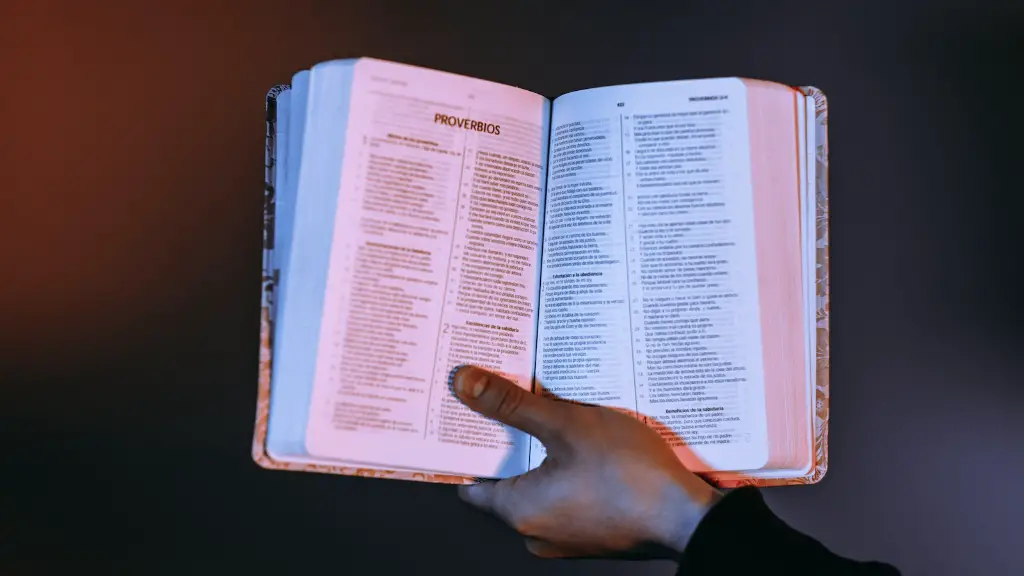What is the Book of Mormon?
The Book of Mormon is a sacred text of the Latter-day Saints, or “Mormons” as they are more commonly called. It claims to be a record of ancient prophets who inhabited North America. It was penned by Joseph Smith in the early 19th century and is believed by Mormon adherents to be the work of God, with the events written within its pages taking place between 600 BC and 400 AD.
Do Biblical Scholars Accept The Book of Mormon?
The answer to this question varies greatly between Biblical scholars. Some do accept the Book of Mormon and its teachings, while others maintain more of a wait-and-see attitude, pointing to the need for more research. One thing that can be agreed upon, however, is that the Book of Mormon is not referenced or mentioned in the Bible.
The Book of Mormon & the Bible
The Bible and the Book of Mormon both have a shared history in that many of the people, doctrines, and stories within them were derived from the same source: the ancient Hebrews. They also both seek to bring mankind nearer to a relationship with God.
However, scholars maintain that the Bible is a more reliable resource when it comes to exploring the age-old questions of faith, morality, and truth. Unlike the Book of Mormon, the Bible is a compilation of writings from many different prophets over centuries, with each author offering a different perspective on the relationship between mankind and God.
What Evidence is There For The Book of Mormon?
Proponents of the Book of Mormon claim that there is a great deal of evidence for its ancient origins. They point to the discovery of the Dead Sea Scrolls in 1947, the discovery of seals, coins, and other artifacts in and around Jerusalem and the surrounding areas, and the many references to the Book of Mormon that appear in other ancient texts.
In addition, researchers have noted similarities between certain passages in the Book of Mormon and other ancient texts, particularly those from the Mesoamerican region. This, combined with the various references to the Book of Mormon in other ancient literature, suggests that the writings contained within it have their roots in a much older, pre-Columbian source.
What Do The Critics Say?
Critics of the Book of Mormon point to the fact that there is no direct archaeological evidence that supports the narrative within its pages. They also cite the fact that much of the history and geography described in the book appears to be highly unlikely, if not impossible. Furthermore, many of the activities and believes described within the book are seen as fantastical or implausible.
In addition, many point to its numerous problems with grammar, punctuation and other literary conventions as proof of its lack of authenticity. Critics argue that it appears to be nothing more than a hastily written work of fiction, crafted from a mishmash of other ancient sources.
The Mormon Response
The Church of Jesus Christ of the Latter-day Saints, commonly referred to as the “Mormons”, continues to defend the authenticity of the Book of Mormon. They point to its various stories and teachings that have been passed down for generations, as well as its similarities to other ancient texts.
However, they continue to maintain that the Book of Mormon can only be understood properly through faith, and that its true purpose is to bring mankind closer to an understanding of God. They argue that it should not be viewed as a historical guide or scientific evidence, but as a spiritual guide.
Does The Book of Mormon Contradict The Bible?
The two books are often seen as being at odds with one another, but this is largely the result of a misunderstanding of their respective purposes. While there are certainly often disagreements about theology and practices, the main focus of both books is the same: to bring mankind closer to a better understanding of God.
The Book of Mormon concentrates on ideas that are rarely touched upon in the Bible, such as the importance of grace and mercy, while the Bible offers teachings on topics like the law and our relationship to God. The two books, while telling different stories, both seek to bring mankind nearer to God.
What Does the Bible Say About The Book of Mormon?
The Bible does not mention the Book of Mormon at all, as the two were written centuries apart. However, its authors did see the need to share similar stories, philosophies and ideas, suggesting that the two books can be seen as complementary rather than contradictory.
The Influence of the Book of Mormon
Despite its controversial nature, the Book of Mormon remains one of the most influential books in America. It has served to bridge the gap between the various Protestant denominations and Mormonism, allowing for more open dialogue between its followers and those of other faiths.
The impact of the book has been felt in the political arena as well, with the former LDS President, Joseph Smith, stating that “no nation can be free unless it recognizes the principle of free agency, or granting equal rights to all men.” In this regard, the Book of Mormon has helped to shape the ideals of freedom and equality for all citizens.
The Ongoing Debate
Despite the fact that the Bible does not mention the Book of Mormon, the debate surrounding it and its validity continues to rage on. Whether or not it can be seen as a reliable source of truth will ultimately be determined by further research, but one thing is certain: the Book of Mormon remains an important part of religious and cultural discussion in the 21st century.
Prophecies in the Book of Mormon
The Book of Mormon has a number of prophecies, prophecies which are claimed to have been fulfilled. One of the most commonly cited prophecies is referred to as the Second Coming of Jesus Christ. This prophecy states that a time will come when Jesus will return to the Earth, and the Book of Mormon claims that this event is rapidly approaching.
In addition to this, the Book of Mormon contains many other prophecies, both concerning the Second Coming and other events. All of these prophecies serve to strengthen the faith of those who hold the Book of Mormon dear, as they offer promises of hope and joy to those who believe.
Are There Scientific Findings Suggesting Evidence of the Book of Mormon?
The Church of Jesus Christ of the Latter-day Saints, has made various claims about the historicity of the Book of Mormon. Much of this revolves around archaeological evidence that supports the narrative contained within its pages, as well as certain genetic studies that appear to validate the book.
The Mormon Church, however, maintains that the Book of Mormon stands on its own merits, and that any scientific evidence is merely supplemental to its teachings. Proponents of the Book of Mormon maintain that the evidence does suggest that it is an ancient text, and thus should be given more credence than if it were merely the work of one person.
The Book of Mormon & World Religions
Many of the world’s major religions, such as Christianity, Islam and Judaism, consider the Bible as the word of God. However, the Book of Mormon, while not regarded as scripture by many of these faiths, is respected as a key part of the Mormon religion.
The Book of Mormon offers teachings that differ to those in the Bible, and as such is oftentimes seen as a complement to the Bible rather than a contradiction of it. This has allowed for a much broader dialogue between adherents of different religions and beliefs, as the Book of Mormon serves to enrich the discussion between them.
Conclusion
The Book of Mormon has tested the boundaries of religious discourse for centuries, with scholars, scientists and theologians alike debating its authenticity and validity. Despite the ongoing debate, however, the Book of Mormon remains an integral part of the Latter-day Saint tradition, with its stories, prophecies, and teachings having become an important part of their faith. Although the Book of Mormon is not directly mentioned in the Bible, its narratives, when taken in context, underscore the importance of faith and the need for humanity to remember its ultimate purpose: to bring us closer to God.



